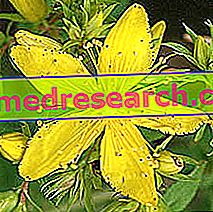
Scientific name
Hypericum perforatum
Family
Hypericaceae (Guttiferae)
Origin
Ubiquitous plant
Synonyms
St. John's Wort
Used Parts
Drug consisting of the flowered, dried tops of Hypericum
Chemical constituents
- Flavonoids (hyperoside, rutin);
- Diantrachinoni (hypericin);
- Essential oil;
- Melatonin;
- Tannins;
- Hyperforin (antibiotic principle).
Hypericum in Herbalism: Properties of the Hypericum
Hypericum oil, obtained by maceration in olive oil, has anti-inflammatory and healing properties.
The hypericum dry extract, taken orally, has antidepressant activity, which at present is confirmed by numerous controlled clinical trials.
Today hypericum finds indication in the medical treatment of mild and medium-sized depressive syndromes, seasonal depression and climacteric syndrome depression, but it is also usable in patients suffering from panic attacks.
Biological activity
The hypericum is attributed anti-inflammatory, healing and, above all, antidepressant and anxiolytic properties.
In particular, the anti-inflammatory action appears to be due to hypericin and to the flavonoid (a flavonoid) contained within the plant itself. Several mechanisms of action are proposed to explain this antiphlogistic action of hypericum. More in detail, from the various research conducted it emerged that hypericum extract is able to inhibit leukocyte infiltration (studies conducted on animals) and that hypericin, on the other hand, is capable of inhibiting the release of arachidonic acid (studies conducted in vitro).
As regards anxiolytic activity, on the other hand, this is exercised by activating the receptor for benzodiazepines. However, a single molecule responsible for the aforementioned activity has not been identified. In fact, the studies carried out have shown that the extract of hypericum as a whole manages to exert an anxiolytic action, but that the single compounds that constitute it - once isolated and administered - do not possess the same efficacy demonstrated, instead, by 'extracted in its entirety. Therefore, it is believed that the anxiolytic activity is due to the whole of the various molecules that fall within the composition, precisely, of the hypericum extract.
A similar argument can be made for the antidepressant activity possessed by the plant. In fact, this action is exercised through various mechanisms that include the inhibition of noradrenaline reuptake, the inhibition of some types of receptors for serotonin and for dopamine and the inhibition of GABA reuptake at the presynaptic level. All these activities seem to be attributable to a synergistic, or additive, action performed by different molecules contained in the hypericum extract, such as hyperforin, hypericin, amentoflavone and rutin.
Furthermore, antibacterial properties are ascribed to hyperforin. In fact, several in vitro studies have highlighted its antimicrobial action against Staphylococcus aureus strains, including methicillin-resistant strains, or MRSA.
Finally, several studies have investigated the potential antitumor properties of hypericin, which seems to be able to exert a cytotoxic action against some types of malignant cells, such as, for example, those constituting human colon cancer.
Hypericum against anxiety and mild depressive disorders
Thanks to the synergistic actions exercised by the various molecules included in the composition of the hypericum extract, the use of this plant, or rather its preparations, has obtained official approval for the treatment of anxiety and minor depressive disorders.
As an indication, for the treatment of the aforementioned disorders, we recommend taking 600-1, 200 mg of extract of hypericum per day, to be taken in 2-3 divided doses. The dosage indicated above refers to a standardized extract of 0.1-0.3% in hypericin, 2-6% in hyperforin and 2-4% in flavonoids. In any case, for further information on this, see the article on "Healing with the Hypericum".
St. John's wort against skin inflammation and to promote wound healing
The hypericum can be used topically in the treatment of inflammation of the skin and to promote the healing of wounds and burns, thanks to the anti-inflammatory and cicatrising action exerted by the substances contained in the extract of this plant and, in particular, by the 'hypericin.
In this case, hypericum is used in the form of a liquid extract, which is generally recommended to be applied directly to the affected area, from two to three times a day.
In any case, also in this case, for further information, it is advisable to consult the dedicated article "Care with the Hypericum".
Hypericum in folk medicine and homeopathy
In folk medicine, hypericum is used internally for the treatment of the most diverse disorders, among which we find: disorders of the respiratory system, such as bronchitis and asthma, disorders of the gall bladder, parasitosis (in particular, worm infestations), gastrointestinal disorders, such as gastritis and diarrhea, nocturnal enuresis and even rheumatism.
Externally, however, hypericum is used as a remedy for muscle pain.
In Chinese medicine, on the other hand, hypericum is used externally in the form of a solution for gargling against tonsillitis and as a skin lotion to counteract dermatosis.
Hypericum is also available as a homeopathic remedy with indications for the treatment of depressive and mood disorders, asthma and lesions of the central and peripheral nervous system.
See also: hypericum in cosmetics
Hypericum - Side Effects
Adverse effects that may occur following the consumption of hypericum are scarce and the main one is represented by cutaneous erythema after exposure to UVA rays for dosages 30-50 times higher than therapeutic ones (photosensitizing properties).
However, caution should be exercised when using the plant, as some studies have also reported the appearance of undesirable effects, such as:
- Gastrointestinal disorders (probably caused by the presence of tannins in the plant);
- Hypertensive crisis;
- Restlessness;
- Relapses with the appearance of anxiety, mania or hypomania;
- Headache;
- Fatigue sensation;
- Slight increase in TSH levels;
- Increased frequency of urination.
Contraindications
Avoid taking hypericum in the event of hypersensitivity to one or more components.
Furthermore, the use of the plant is contraindicated in pregnancy and - as a precaution - even during lactation.
Pharmacological Interactions
Hypericum can interfere with many types of drugs. In particular, this plant can:
- Strengthen the pharmacological effects of antidepressant drugs (in particular, SSRI and MAOI ), favoring the appearance of the serotonin syndrome (characterized by symptoms such as agitation, mental confusion, hypomania, arterial pressure disorders, tachycardia, chills, hyperthermia, tremors, rigidity, diarrhea);
- Induce the hepatic microsomal system (cytochrome P450), thus interfering with the pharmacokinetics of some drugs, such as:
- Theophylline ;
- Digoxin ;
- Oral anticoagulants ;
- Immunosuppressants (such as cyclosporine, tacrolimus, sirolimus, etc.);
- Antivirals (such as darunavir);
- Steroid drugs .
- Interfering with the metabolism of:
- Antitumorals (such as taxol, tamoxifen, etoposide, etc.);
- Oral hypoglycemic agents (such as tolbutamide);
- Antihypertensives and antianginosis (such as torasemide, losartan, nifedipine and diltiazem);
- Anticonvulsants (such as carbamazepine and phenytoin);
- Antiarrhythmics (such as quinidine);
- Antibiotics (such as erythromycin);
- Beta-blockers .



